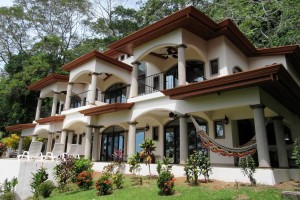Consider Cash When Buying a Vacation Home Overseas
U.S. residents buying vacation homes overseas may find that financing their slice of paradise isn’t so dreamy.

By: Anya Martin
April 1st, 2015
The Wall Street Journal
Breathtaking ocean views, a five-minute walk to the beach, and regular sightings of toucans, iguanas and sloths— Todd Harris and Mary Bradley own their slice of paradise called Villa Alegria in Costa Rica. Financing their vacation home, however, wasn’t as dreamy.
When buying their Mediterranean-style villa in Dominical, a popular surfing destination on the Pacific, the Atlanta couple approached a Costa Rican bank—and were offered a mortgage with an above 7% interest rate. At that time, April 2014, average rates for a 30-year fixed-rate jumbo mortgage in the U.S. were 4.45%, according to HSH.com, a mortgage-information website.
So Mr. Harris, a 37-year-old independent investor, and Ms. Bradley, a 34-year-old stay-at-home mom, paid cash for the vacation home.
That’s what many Americans buying property abroad do, says Kathleen Peddicord, founder of Panama City-based Live and Invest Overseas, which publishes an online newsletter and books on living, retiring and investing in foreign real estate. Most U.S. banks won’t lend for purchases outside the country, but Americans who really want to finance a foreign home do have some options, she adds. Borrowers first need to realize that many countries don’t even have mortgage lenders, Ms. Peddicord says. “In Europe, there’s a more sophisticated, competitive lending industry, but in Latin America, there’s not,†she adds.
Foreign banks that do lend to U.S. citizens will ask borrowers to make at least a 20% down payment, if not 30% or more, and pay higher interest rates than they’d get in the U.S., Ms. Peddicord says. Also, 30-year fixed-rate mortgages are virtually unknown in other countries, with the standard being an adjustable-rate mortgage with a 20- to 25-year total term, she adds.
Because the foreclosure process isn’t as refined in most countries as in the U.S., a borrower also may be required to take out a life-insurance policy in the loan amount with the bank as beneficiary, Ms. Peddicord says. Insurers in some countries place age limits on who can get a life-insurance policy, such as Panama (typically age 75).
‘Most U.S. banks won’t lend for purchases outside the country, but Americans who really want to finance a foreign home do have some options.’
U.S. borrowers with holdings at a global bank may be able tap into that relationship when getting financing abroad, says Saul Rasminsky, owner/broker of Dominical Real Estate, which helped Mr. Harris and Ms. Bradley find their Costa Rica home.
HSBC, which has operations in 73 countries, will refer its U.S. “premier†customers—those who hold at least $100,000 in an account—to relationship managers in other countries, says Peter Alongi, a senior mortgage manager with HSBC Bank USA.
In 10 years of selling homes in Costa Rica, Mr. Rasminsky has only had one buyer who used mortgage financing, because of the high cost. On the other hand, he has often brokered seller-financed loans, he says. “It’s not uncommon for a buyer to put 30% to 50% down and have up to five years of owner financing in the 3% to 5% [annual interest rate] range,†he adds.
Some buyers also have taken out home-equity loans or lines of credit on their primary residences in the U.S. to help finance a Costa Rica home purchase, Mr. Rasminsky says. Costa Rica sellers accept U.S. dollars rather than requiring local currency, and homes prices are typically listed in dollars, he adds.
Mr. Harris and Ms. Bradley spent about four months last year in their Costa Rica home and rent it out for an average of $2,500 a week.
“Costa Rica from Atlanta is an easy destination and it’s different in that it’s not like going to a resort,†Mr. Harris says.
Here are a few more tips for financing an overseas home:
• Self-directed IRA. If the purchase is solely a rental or investment property, a buyer may be able to set up a self-directed IRA or other retirement plan and use those funds to make the purchase, Ms. Peddicord says. All expenses related to maintaining the property are paid by the IRA. The account holder cannot use the property—even occasionally—until after retirement.
• Check local laws. In some countries, noncitizens and/or nonresidents aren’t allowed to buy real estate, or are limited to a certain number of permits a year, says Stuart Siegel, president and CEO of the New York office of Hamburg, Germany-based global real-estate brokerage Engel & Völkers. “If you want to buy a ski chalet in Switzerland and aren’t a Swiss resident, you need to make certain if you are eligible to buy it,†he adds.
• Exit strategy. Local market conditions and limitations on who is allowed to buy property can also make it difficult to sell a home when it’s time to move on, Mr. Siegel says. Even though they love their Costa Rica home, Mr. Harris and Ms. Bradley have listed it for sale at $895,000 as a precaution because homes there can take years to sell, Mr. Harris says.
Published by